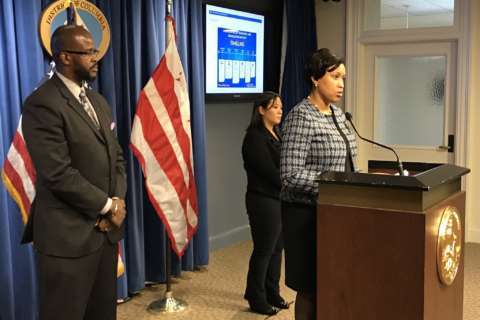
WASHINGTON — With independent audits showing too many D.C. school students were promoted when they shouldn’t have been, the city’s school chancellor is trying to figure out how and why it happened. And there’s growing concern that teachers simply felt their jobs depended on passing students, whether the promotion was earned or not.
Even if that perception wasn’t a reality, D.C. Schools Chancellor Antwan Wilson told teachers this week student performance will not factor into their evaluations this academic year.
A memo sent by Wilson said the city will study policies and performance measures to determine what’s most appropriate for evaluations starting in the next academic year. The move is applauded by David Grosso, D.C. council member and education committee chairman.
“This is one small way that he can try to fix that,” Grosso said.
“It was such a small percentage of the weight that was put on – whether or not you passed a student on to the next grade. But they said clearly in my hearings that teachers felt pressure so I’m glad he’s doing something.”
Grosso concedes there is pressure coming down on to teachers from the city’s central office, and that if part of a teacher’s measurement was “moving students on, then I guess they used that as a proxy for what actually was happening with a student’s abilities,” he said.
As Wilson and others in the city’s central office try to re-assess the city’s evaluation methods, Grosso said he hopes the city will spend more time looking at what he describes as a student’s “longitudinal data” from other years.
“Rather than judging a teacher’s performance on how well a student does that one particular year or class,” it would be better to assess how much growth a student shows over the course of a year compared to where they were academically at the start of the year, Grosso said.
“Let’s say a student presents herself in the eighth grade math class being on a fifth grade math level, and that teacher actually moves her up to seventh grade. So she moved to two grades in level, but they don’t get any credit in their IMPACT (the evaluation system) for that because she didn’t actually get her on to the ninth grade level. And that is still progress and a good thing because the student moved two grades. But we haven’t measured that very well,” he said.
That’s just one idea for addressing what Grosso acknowledges is complicated and difficult to measure.
“It’s clear that the folks in central office at DCPS did not do a good job training teachers and administrators in the school buildings on grading policy, on attendance policies, and on this credit recovery stuff. And the fact of the matter is the chancellor now has an opportunity to turn that around and do the proper training and he’s going to do that,” Grosso said.








